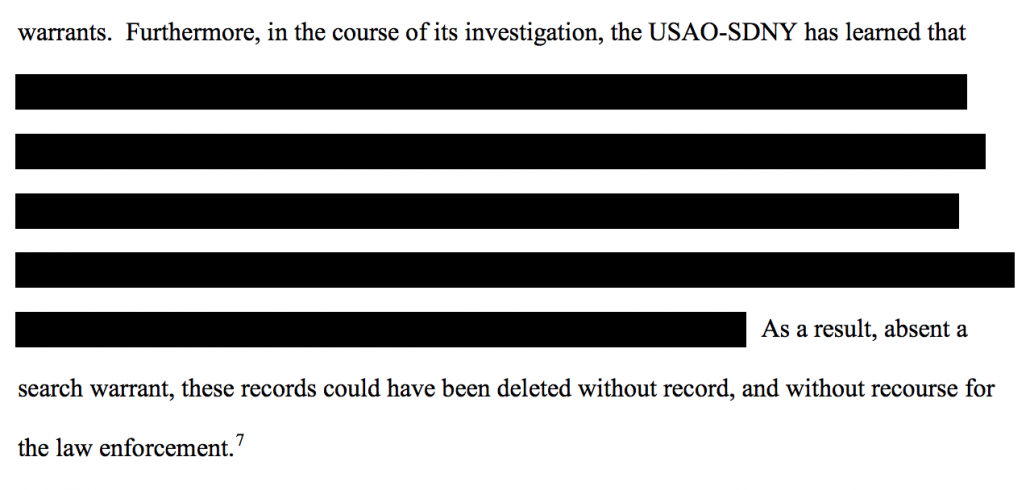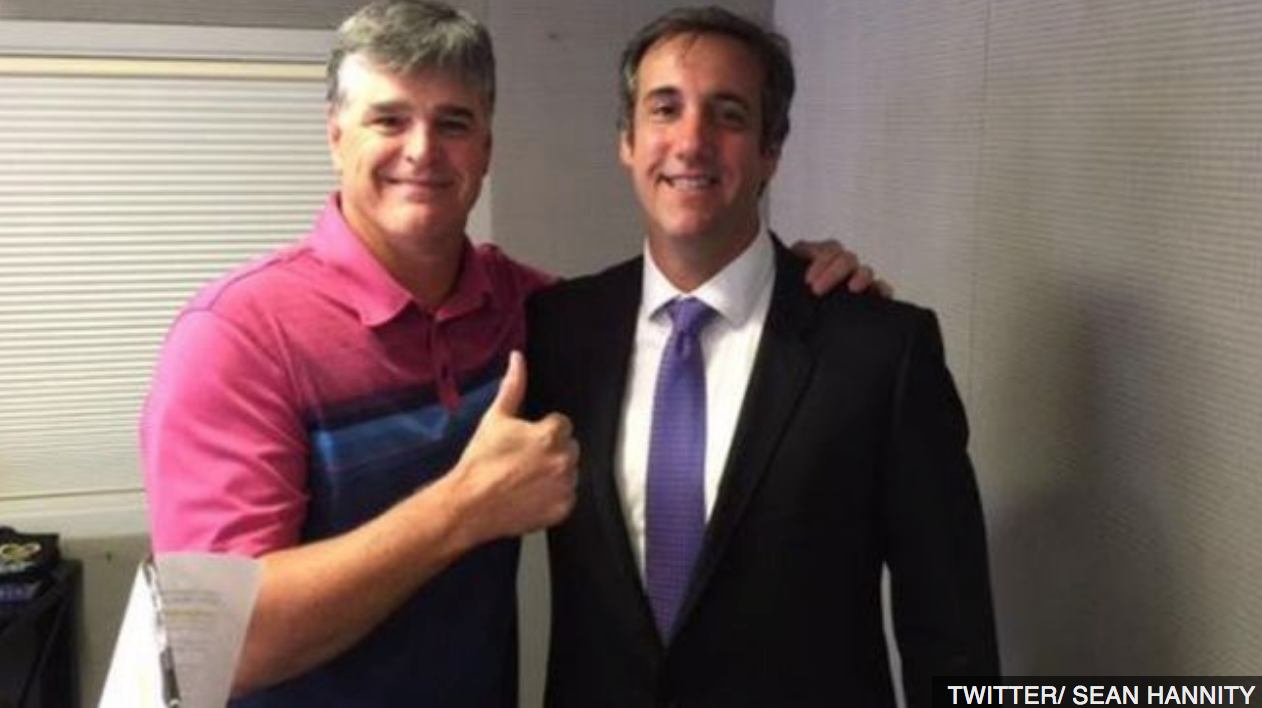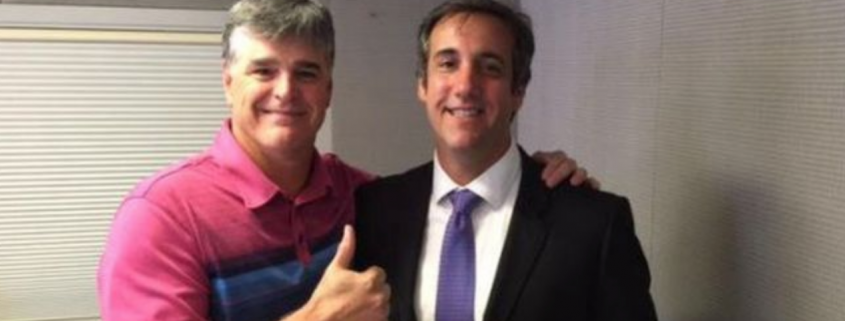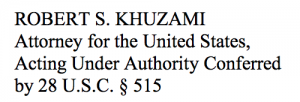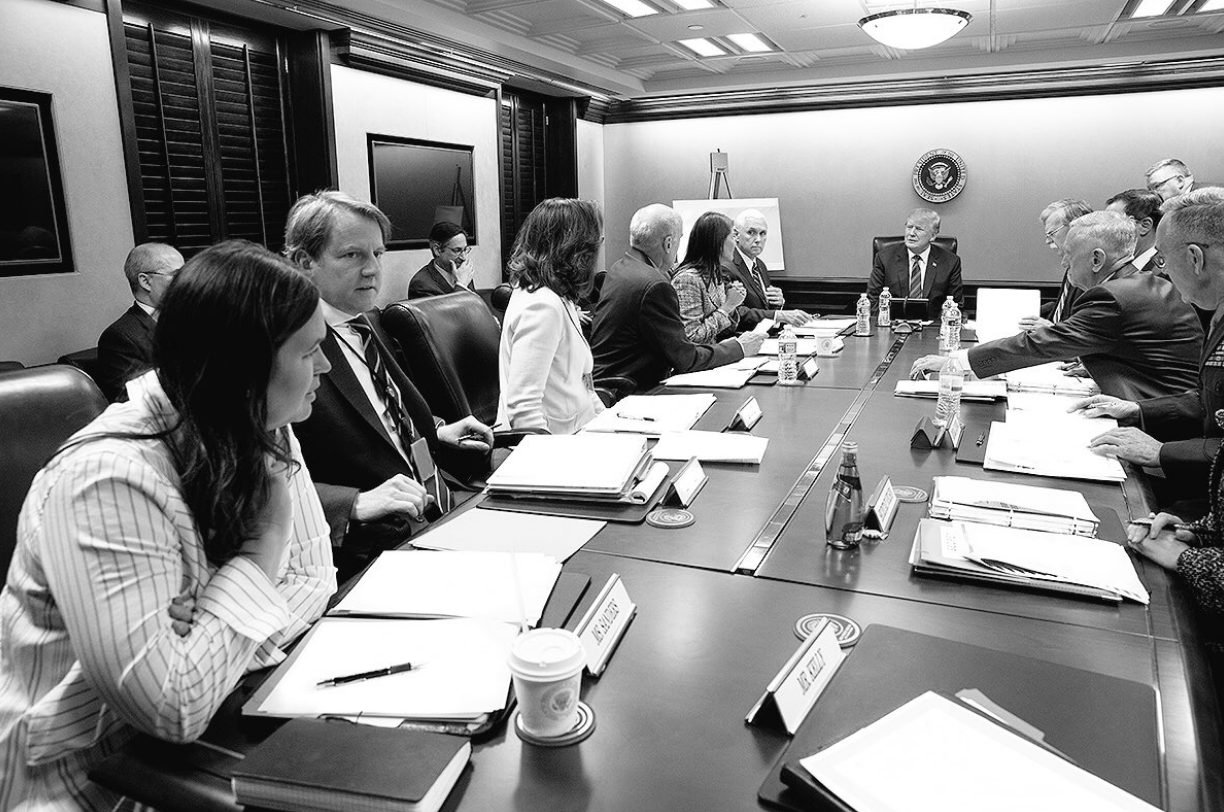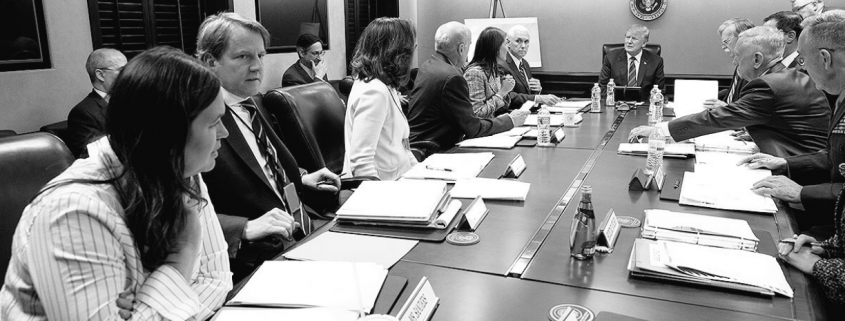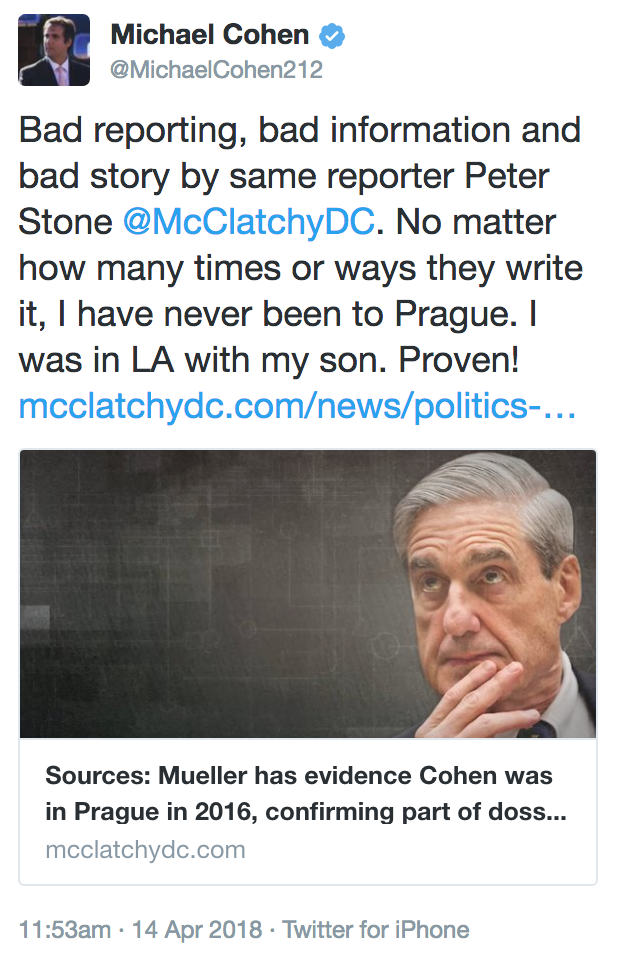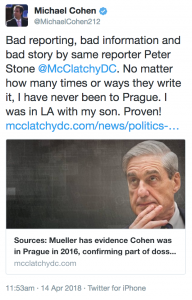The Andrew McCabe Referral Is Unsurprising — and Probably Justified
I’ve been traveling a shit-ton in recent weeks (and still am, in a lovely gorgeous undisclosed location). So it wasn’t until a flight today that I read the DOJ IG Report on Andrew McCabe’s lack of candor about confirming an investigation into the Clinton Foundation. Having finally read it, though, I’m thoroughly unsurprised that DOJ made a criminal referral. Indeed, given the standards FBI holds subjects of investigation to, I think the referral was necessary to avoid the perception that the top FBI brass could get away with behavior that results in criminal charges (for people including George Papadopoulos and Mike Flynn) all the time.
Because boy did Deputy and Acting FBI Director Andrew McCabe use a lot of the tricks that defendants (try, usually unsuccessfully) to use to get out of lying.
Andrew McCabe was investigated for screwing Hillary over
Before I get into the report, let’s make it clear what McCabe is accused of (because the right wing gets this wrong seemingly every time). As part of an investigation into several leaks, McCabe was interviewed repeatedly about this article by Devlin Barrett, specifically this passage.
According to a person familiar with the probes, on Aug. 12, a senior Justice Department official called Mr. McCabe to voice his displeasure at finding that New York FBI agents were still openly pursuing the Clinton Foundation probe during the election season. Mr. McCabe said agents still had the authority to pursue the issue as long as they didn’t use overt methods requiring Justice Department approvals.
The Justice Department official was “very pissed off,” according to one person close to Mr. McCabe, and pressed him to explain why the FBI was still chasing a matter the department considered dormant. Others said the Justice Department was simply trying to make sure FBI agents were following longstanding policy not to make overt investigative moves that could be seen as trying to influence an election. Those rules discourage investigators from making any such moves before a primary or general election, and, at a minimum, checking with anticorruption prosecutors before doing so.
“Are you telling me that I need to shut down a validly predicated investigation?” Mr. McCabe asked, according to people familiar with the conversation. After a pause, the official replied, “Of course not,” these people said.
The passage, coming in a story on the reopening of the investigation into Hillary’s emails, effectively confirmed the separate investigation into the Clinton Foundation.
After denying it in two interviews, he admitted in a third and fourth (though continued to lie about his transparency about the fact) that he had authorized Lisa Page to provide the background and the quote to Barrett.
Effectively, then, McCabe admitted to confirming 10 days before the election that there was a second investigation into Hillary Clinton. DOJ IG (and the FBI witnesses they consulted) concluded that McCabe did so to protect his own reputation, not to reassure the public that Hillary wasn’t above scrutiny. And they dismissed the notion it was a sanctioned confirmation, both because it was not discussed beforehand and carefully messaged, as such confirmations always are, and because it was anonymous.
So for all that Republicans, starting with Donald Trump, want to make this into a real scandal hurting Republicans, it’s the opposite. McCabe is accused of screwing over Hillary to protect his own reputation.
Signs the report was rushed
I find the report itself very credible; it makes a very damning case against McCabe.
But there are a few details of it that deserve mention, because they demonstrate that this report is just part of the larger report that will be released next month.
First, there is no methodology or request for comment from the bureau (though it includes rebuttals from McCabe), which are both standard features on IG Reports. The methodology would be really useful to see because it would provide a few more dates about when a draft was finalized, that might provide more information on how this came to be released early.
Then there’s a redaction in this passage.
Both public reporting and redaction matching suggests it has to be DAD — that is, Peter Strzok. Other references to him are not redacted. For some reason, and I suspect it’s an investigative one, the FBI didn’t want it known that he was party to the decision of forcing McCabe off the email investigation in late October, just days before the WSJ story in question.
That (and one other detail I get to below) suggests the FBI is protecting the details on Strzok and Page that will show up in the larger report.
So this report was, as public reporting has suggested, pulled out of the larger one and packaged up for February release.
That said, I’m not as convinced that served the nefarious purpose of serving up Andrew McCabe to Donald Trump’s voracious firing appetite. Rather, I suspect that’s when they reached the conclusion that McCabe’s behavior reached a level requiring criminal referral. And while I agree the circumstances surrounding McCabe’s firing still stink to high hell, if they had already made the decision to refer McCabe for criminal investigation, the timing, and the necessity of firing him, do make more sense.
This case really is about lying to FBI Agents
In the same way the Republican claim McCabe hurt Trump is bullshit, another public claim — one favored by some Democrats — is that this is simply a he-said he-said between McCabe and Comey.
While one conversation between them — an October 31, 2016 conversation where leaks came up and McCabe did not offer up that he was behind the WSJ passage — is included in the allegations, the other three, far more compelling, allegations include sworn conversations (the latter two taped) with FBI Inspection Division and Inspector General Agents.
And as I said, this is not — as McCabe has spun it — about an authorized confirmation of an investigation. It is true he gave permission for these conversations. But he did not go through the normal process before confirming an investigation (which wouldn’t have been approved but if it had would have resulted in an on-the-record comment). It’s likely McCabe, out of fury, just fucked up. But he did authorize the anonymous leak of stuff that shouldn’t have been released.
I won’t get into the evidence laid out (other than to say that it is convincing). But the report suggests McCabe didn’t come clean to Comey in October, and then in two subsequent interviews tried to create a cover story, only to discover that the investigation into Page and Strzok would reveal his deceit, at which point he tried to clean up his story in a way that wouldn’t put him in legal jeopardy.
Un-fucking-believably, as McCabe tried to get out of the problems he created he used three dodges often used by criminal defendants when complaining about FBI investigative tactics.
McCabe “can’t recall” diversion one
Along the way, McCabe created two diversions to deflect blame (the IG Report doesn’t focus on this, but I find these actions to be among McCabe’s most reprehensible for the way they exposed others to disciplinary and legal jeopardy).
First, in the wake of the Barrett story that he was a second-hand anonymous source for, McCabe called the heads of the NY and DC office to bitch them out for leaking.
According to NY-ADIC’s contemporaneous October 30 calendar notes and testimony to the OIG, McCabe called NY-ADIC on Sunday, October 30, at 5:11 p.m., to express concerns over leaks from the FBI’s New York Field Office in the October 30 WSJ article. NY-ADIC told the OIG that McCabe was “ticked about leaks” in the article on the CF Investigation, but NY-ADIC “pushed back” a little to note that New York agents were not privy to some of the information in the article.
Also according to NY-ADIC’s calendar notes, as well as his testimony to the OIG, NY-ADIC spoke to EAD and other FBI managers after his call with McCabe to voice concerns “about getting yelled at about this stuff” when he was supposed to be dealing with EAD on Clinton Foundation issues because of his understanding that McCabe had recused himself from the matter.
W-ADIC told the OIG that he received a call from McCabe regarding the October 30 WSJ article and that McCabe admonished him regarding leaks in the article. According to W-ADIC, McCabe told him to “get his house in order.”
McCabe told us that he did not recall calling either NY-ADIC or W-ADIC to reprimand them for leaks in the October 30 WSJ article.
He did so with the NY-ADIC (probably justifiably) after a second Barrett story.
I believe the first of these scoldings served the purpose of creating a paper trail making it look like other offices were responsible for the Barrett leak.
With regards to both of these hypocritical conversations, in which McCabe pulled rank to yell at people for doing what he had himself done, he claimed afterwards not to recall the conversations in question (and bizarrely for a lifetime FBI Agent, didn’t take the notes that his counterparties did).
I think the first one is of particular concern, as by blaming the field offices, McCabe was deflecting from his own role. And like a long line of high level officials before him, he got away with it by claiming he didn’t recall these conversations.
McCabe blames diversion two on the perennial two-Agent, no recording complaint
McCabe also created a diversion in his first interview, with the Inspection Division (which, because of rank, he knew could not investigate him personally). He told them, falsely, that he had told a bunch of other people about the conversation described in the WSJ, leading INSD to believe there could be any number of suspects.
INSD-SSA1 further told the OIG that McCabe stated during the interview that he had related the account of the August 12 call to others numerous times, leaving INSD-SSA1 with the impression that INSD-SSA1 would “not get anywhere by asking” McCabe how many people could have known about what appeared to be a private conversation between him and PADAG. INSD-SSA1 told us that he didn’t need to take many notes during the interview because, at that point, he viewed McCabe as “the victim” of the leak and McCabe had told the INSD agents that he did not know how this happened. INSD-SSA1 also told us that the whole interaction was short, maybe 5 to 7 minutes, and flowing because McCabe was seemingly the victim and claimed he did not know who did it. INSD-SSA1 said that McCabe’s information could be summarized in one paragraph in his draft statement.
This led them to give up their investigation, for a period. When they sent him their version of the statements he had made to get him to sign and swear to them, he just blew off the request (he was Acting Director at this point, so he admittedly had tons of other things to do, but also real reason to believe his seniority would help him avoid any trouble for his actions).
When McCabe ultimately came clean about his role in this affair, he tried to suggest that the INSD version of what happened was not accurate (as defendants sometimes do, often for good reason, when an FBI 302 leaves out key details). Remarkably though, this guy who must have seen this ploy hundreds of times in his life and knew that FBI Agents always move in twos, suggested that the specific discussion involved just one of the Agents present.
McCabe also asserted that the May 9 meeting concerned an unrelated leak matter and that the discussion about the October 30 article occurred near the end of the meeting when “one of the people on that team pulled me aside and asked me a question about the Wall Street Journal article.” He elaborated by stating that as the INSD agents were “walking out of my office into the hallway, and [INSD Section Chief] kind of grabbed me by the arm and said, hey, let me ask you about something else.” McCabe said that he and INSD-Section Chief were still in his office, he thought standing, during the conversation but that the other two INSD agents (McCabe recalled there being three INSD agents present that day, not two) were outside his office. He said INSD-Section Chief showed him the October 30 WSJ article at that time and asked him “a question or two about it. And that was it. It was a very quick exchange.”
If it had indeed happened this way, it would have made the conversation other than investigative, and might have gotten him off the hook for lying.
Except that SSA-1 took notes, so was obviously present, and INSD made McCabe initial the WSJ article confirming he had read it.
Nevertheless, this is, ultimately, the same complaint criminal defendants make all the time about the FBI’s approach to interviews.
McCabe mounts a Miranda defense
Perhaps most un-fucking-believably, McCabe mounted a Miranda defense to excuse the fact that he lied when he was first asked about the Page-Strzok texts. Effectively, he said that he had an explicit agreement that OIG would not ask him any questions that might put him in legal jeopardy.
In response to review a draft of this report, counsel for McCabe argued that, in asking McCabe about the October 27-30 texts between Special Counsel and DAD regarding the WSJ article, the OIG engaged in improper and unethical conduct, and violated an allegedly explicit agreement with McCabe that when he was interviewed by the OIG on July 28 he would not be questioned outside the presence of counsel with respect to matters for which he was being investigated. McCabe provides no evidence in support of his claim, and based on the OIG’s review of the available evidence, including the transcript of McCabe’s recorded OIG interview on July 28 and the OIG’s contemporaneous notes, as described below, McCabe’s claim is contradicted by the investigative record.
As an initial matter, at the time of the July 28 interview, McCabe was not a subject of an OIG investigation of disclosures in the October 30 WSJ article, nor did the OIG suspect him of having been the source of an unauthorized disclosure of non-public information related to that article. The OIG did not open its investigation of McCabe concerning the WSJ article until August 31, after being informed by INSD that McCabe had provided INSD agents with information on August 18, 2017, that contradicted the information that he had provided to INSD agents on May 9.
Second, the OIG has no record that McCabe stated in advance of the July 28 interview that he was represented by counsel. Moreover, the recording of the July 28 interview shows that at no time did McCabe give any indication that he was represented by counsel. The transcript of the interview shows that the OIG informed McCabe, who has a law degree, that the interview was about “issues raised by the text messages” between Special Counsel and DAD, and that the OIG would not be asking McCabe questions about “other issues related to your recusal in the McAulliffe investigation . . . or any issues related to that.” McCabe responded “Okay” and did not articulate or request any further limitations on the questions he would answer. The OIG added that “This is a voluntary interview. What that means is that if you don’t want to answer a question, that’s fully within your rights.” That “will not be held against you . . . .” The recording of McCabe’s interview further demonstrates that the OIG was entirely solicitous of McCabe’s requests not to respond to certain questions. Towards the end of the interview, before beginning an area of questioning unrelated to Special Counsel/DAD texts or the WSJ article, the OIG prefaced his question to McCabe by stating “if you feel this is connected to the things that are making you uncomfortable, will you let me know?” McCabe responded, “Yes. Yeah, you can ask, I’ll let you . . . If I don’t feel comfortable going forward, I’ll let you know.” At a later point in the interview, after answering a number of questions unrelated to Special Counsel/DAD texts, McCabe expressed a preference for not answering further questions, and the OIG did not ask further questions on the topic. [my emphasis]
I mean, sure, OIG blew that excuse out of the water (and the rebuttal continued with further evidence this claim was bullshit). But when I was reading it I kept thinking “how many fucking times have you been the Agent giving the uneducated interviewee even less opportunity to invoke Miranda! Yet you fucked this up!?!?!”
Did McCabe coordinate his story with Page?
As noted, McCabe’s true undoing came when, in the course of the investigation into the treatment of Hillary, OIG discovered the Page-Strzok texts. McCabe was asked about them in the context of the Page-Strzok contacts, and realized (but lied in a sworn, recorded interview) that the texts disproved all his stories. That led him to correct his testimony to INSD, which then referred it to OIG so someone of the rank that could investigate McCabe could interview him.
Along the way, though, McCabe and Page had a conversation — one she subsequently copped to, but he did not.
McCabe denied that being shown the text messages on July 28 that indicated Special Counsel had spoken to Barrett caused him to change his account in order to protect Special Counsel. McCabe told the OIG that this “thinking process” was done “on my own” without talking to any FBI employees or reviewing past e-mails or text messages. He stated that he did not discuss the Devlin texts with Special Counsel after the July 28 interview. While Special Counsel told the OIG that following McCabe’s July 28 OIG interview, she and McCabe discussed her text messages, she said that McCabe did not discuss his OIG testimony about the WSJ article, or the WSJ article itself, at that time. Special Counsel stated that she and McCabe did not discuss “getting their stories straight” with respect to the WSJ article. Special Counsel told the OIG that the last time she spoke with McCabe about the WSJ article was in approximately October 2016 (when the article was published).
This was not included among the key lack of candor charges, but I suspect the prosecutor will test the veracity of this current operative story.
I get that the way McCabe was fired stinks. I get that McCabe may well be serving as cover for the Mueller interview.
But neither of those observations changes the fact that one of the most senior FBI executives tried all the tricks a lifetime of pursuing criminals would have familiarized him with, and he still blew it.
And because the FBI relies on false statements charges to conduct its interviews, I think the criminal referral is necessary.





